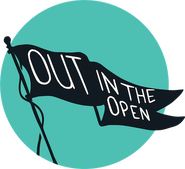Earth Gay 2017
-by Naomi Ullian-
When the rain let up and a balmy spring day offered gusty breezes and fresh sun, I wandered over to Guilford, VT, to visit with farmers Justin Nye and Amy Frost of Circle Mountain Farm about the upcoming Earth Gay Vermont! celebration that they will be co-hosting with Green Mountain Crossroads on May 21st.
The event's third year at Circle Mountain, the farmers expressed the hope that folks will come out to celebrate local food systems and queer-run agriculture whether or not participants are excited or able to help with whatever work projects will be happening.
"If you don't want to work, or can't, just come hang out and be part of the crew," says Amy.
In past years, projects have included making big compost piles and fertilizing the hoophouse tomatoes.
"Part of what I love about this partnership is that I never know what exactly it is that we'll be doing!" says GMC executive director HB Lozito. "I trust Amy & Justin to come up with the projects knowing that they'll find a magic combination between what needs to get done on the farm and what will be fun for a big group."
Kneeling in the dirt rows as I helped to harvest the tender spinach, Amy and Justin weighed in on the subjects of queerness, farming, land stewardship, and how to build queer rural community.
In considering what it meant to be queer and farmers in this rural community, Amy and Justin agreed that "the queer community has been really supportive of us as farmers, and it feels good to provide food for other queer people that we maybe share experiences with."
Work projects such as the event at Earth Gay is one way that queer people can build relationships in rural areas, where geography, the economy, and small populations can make it feel hard to connect. Some of our longest friendships, we all agreed, have ignited while doing work -- setting out tasks, accomplishing goals, and building together.
"Its pretty empowering to get shit done together," observes Amy. In rural areas, Amy notes, it’s especially important to prioritize connection, and working together and feeding each other is fundamentally a rural value that queers can get down with.
Farming and the production of food is one way that queer folks are often able to connect to their bodies, to invest and build confidence and care in their physical capacities in a world that often encouraged everyone and especially queer people to dissociate or feel alienated from their bodies, desires, and genders.
HB notes about Earth Gay, "There is a personal sustainability piece around using our bodies together to do good work. So often as LGBTQ people we feel alienated from our bodies. I find for myself that getting outside and having a positive experience accomplishing physical tasks together as a group with other LGBTQ folks and allies helps me reconnect to my own body and what it is capable of. "
In the labors of farming, the body becomes a hard-working participant along with microbes and chickens and brassicas, and many folks who farm find power, agency, and peacefulness in choosing work that allows them to show up as themselves, to accomplish tasks that provide for their community, and to find the quiet and realness and sanity that comes from working with your hands.
"Earth Gay is one of the times during the year that we dig in (ha) to what environmental justice, food access, sustainability, and community organizing look like in our rural community," says HB. "We know that climate change will increasingly affect us, and that one way to build powerful, resilient communities is to support local farms and farmers."
Farmers serve as intermediaries between human communities and the plant and animal worlds. By choosing small-scale and sustainable cultivation practices, farmers both help humans meet needs for nourishment as well as steward the land and protect it from degradation. Many queer individuals and communities challenge and embody subversion of the binary or dualistic perspectives which capitalism thrives on. Interacting with land through a queer lens can help farmers to challenge the way that monocropping and agribusiness objectify the land as a non-living entity that exists solely for human benefit and disposal. The experience of land stewardship through sustainable agriculture puts queer farmers and participants in sustainable food ways at a political opportunity to protect land from binary extractive relationships with human communities, and queer farmers can serve to lead the interventions and disruption of the capitalist relationship humans have developed with farmland, instead encouraging human communities to understand the collaboration with the many moving and sentient beings -- animals, plants, fungi, minerals -- that join forces to produce food that humans can gratefully benefit from.
Farming, queers understand, is about relationships, and tending to them.
Amy and Justin say, of Circle Mountain Farm, that they also hope for the farm to feel like a refuge or retreat, a place folks can come to recharge and feel safe.
Even in small liberal towns, farming can feel dominated by hetero and cisgender family units, rendering less visible the hardworking LGBTQ folks growing food for rural communities. Says HB, "Especially in a state like Vermont that projects a strong agricultural history and future, we are saying, ‘LGBTQ people are, and have always been, a part of the strong ag traditions and future here in our state’."
